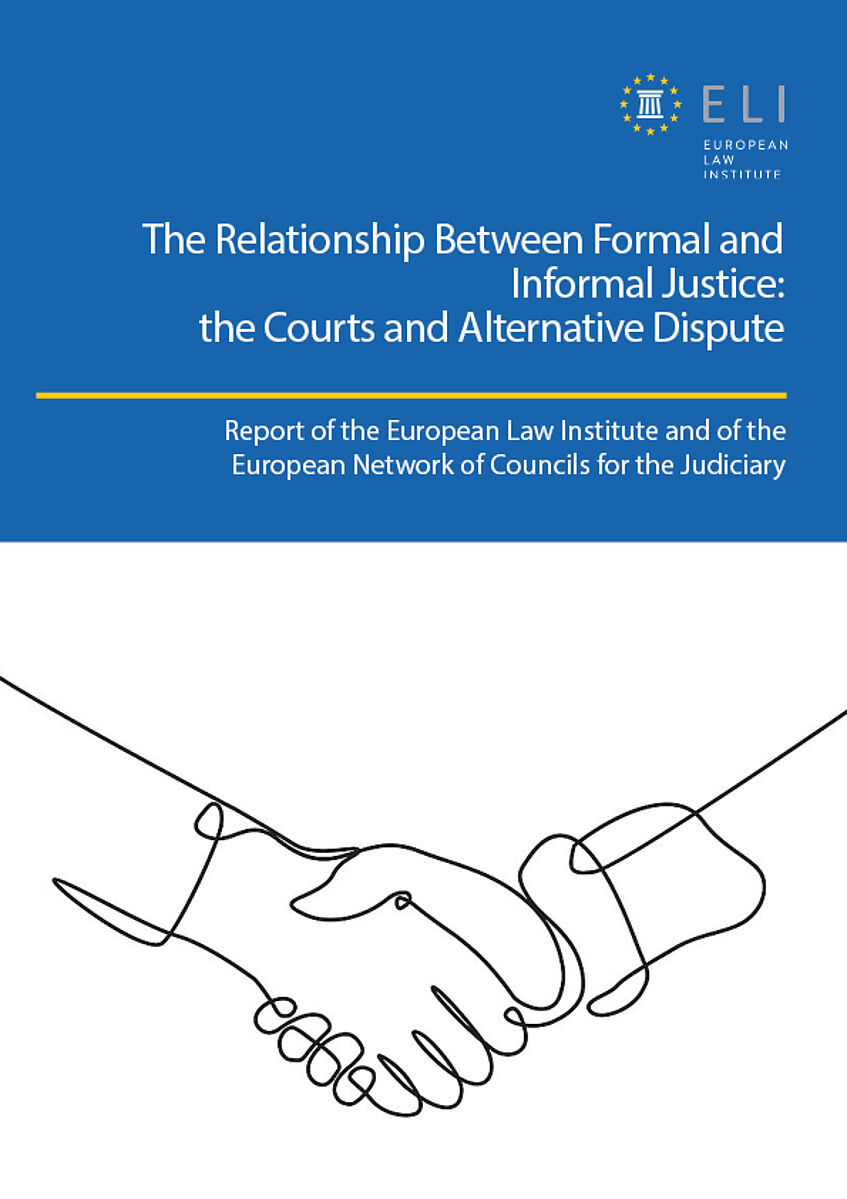ELI-ENCJ Report On The Relationship Between Formal and Informal Justice: the Courts and Alternative Dispute Resolution
Summary
The ELI-ENCJ Statement tackled the question of how courts and judges should act in considering or referring cases to ADR. It collected European best practices and provided recommendations as to the best European models that can be developed and applied for coherent access to dispute resolution processes in respect of different types of disputes, and towards which Member States may wish to progress.
Background
Over the past 40 years, there has been a significant growth in and use of alternative forms of dispute resolution (ADR) throughout Europe. In addition to national developments, there have been developments at the European level. There are currently three main ADR instruments in force in the EU (the ADR instruments). Their aim is to 'contribute to the proper functioning of the internal market' and to ensure access to 'simple, efficient, fast and low-cost' ways of resolving disputes. They aim at limited harmonisation and leave much choice for Member States. In addition to State promotion of ADR, there has been a growth in private sector promotion of ADR through, for instance, contractual clauses in consumer or business contracts that specify that any disputes arising under the contract must be resolved via a relevant form of ADR, eg a form of mandatory online dispute resolution (ODR) mechanism or arbitration scheme.
The various developments have left a patchwork quilt of ADR provisions. In some Member States the use of some forms of ADR, such as mediation, prior to resort to formal litigation before the courts, is a mandatory pre-requisite, eg Italy. In other Member States, such as the United Kingdom, use of ADR is optional, albeit its use is promoted by the State generally and by courts in particular. Such differential developments may lead to a myriad of different ADR bodies that are alien and unfamiliar to foreign nationals. This in turn may undermine trust and confidence in such mechanisms, and their ability to deliver cost-effective, timely and fair dispute resolution across Member States’ borders. Furthermore, as the ENCJ has noted, there is a growing risk, and in some cases reality, that ADR is being developed in a manner that is improperly intruding on the legitimate ambit of the judicial branch of the State or government.
Objectives
The project team aimed at analysing whether ADR schemes are voluntary, sufficiently visible and transparent, of sufficient quality in procedure and dispute resolution, and whether they develop throughout EU Member States consistently with a proper and principled approach to access to the courts. Based on national reports, and research conducted by members of the project team, an ELI Statement was prepared which assesses whether concrete steps should be taken in this regard. Furthermore, the project team also considered: (a) the potential for developing a draft legislative instrument for the EU aimed at harmonising ADR across the EU; and (b) the role that Internet technology can properly play in the development of online courts and online dispute resolution, consistent with the principles identified in the first phase of the project.
Outcome
The Statement deals with how courts and judges should act in considering or referring cases to Alternative Dispute Resolution (ADR) and consists of two main parts: (a) a Statement of European Best Practice in relation to the approach that courts and judges should adopt in interacting with all types of ADR processes; and (b) Recommendations as to the best European models that can be developed and applied for coherent access to dispute resolution processes (DRPs) in respect of different types of dispute, and towards which Member States may wish to progress.
It will be of particular interest for judges and ADR practitioners dealing with the issues discussed on a daily basis as well as for decision makers responsible for designing effective DRPs.
Project Reporters
- Geoffrey Vos
- Diana Wallis
Further Members Appointed by the ELI
- Fabrizio Cafaggi
- Tomasz Dudek
- Paul Gilligan
- Christopher Hodges
- John Sorabji
- Stefaan Voet
- Aleš Zalar
Further Members Appointed by the ENCJ
- Stanislav Georgiev
- Monique van der Goes
- John Hedigan
- Lourdes Arastey Sahun
- Davis Simone
- Alessio Zaccaria
Advisory Committee
- Loïc Caidet
- Ignat Claudiu
- Horst Eidenmüller
- Sabine König
- Marcello Marinari
- Rada Matjusina
- Maud Piers
- Felix Steffek
- Louise Ellen Teitz

